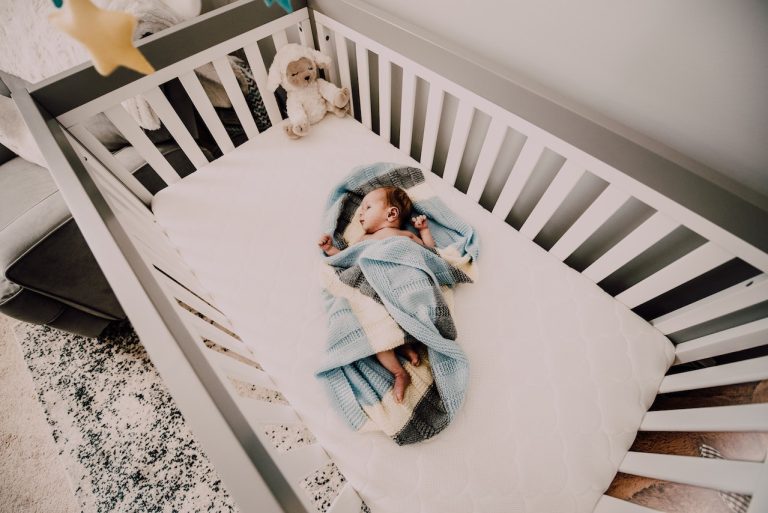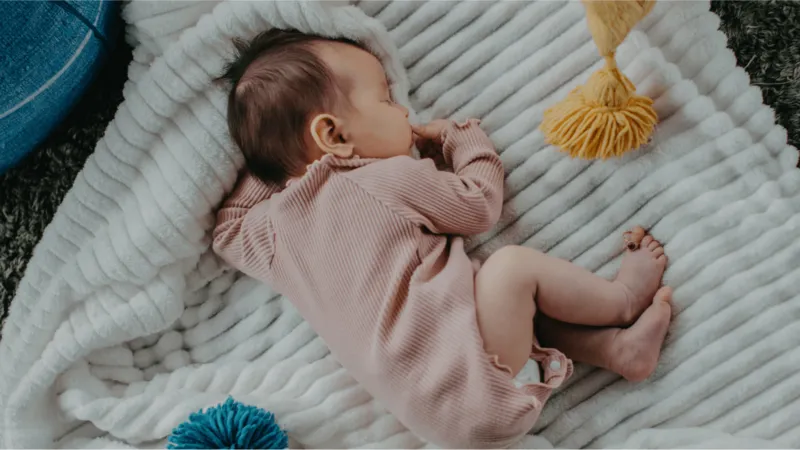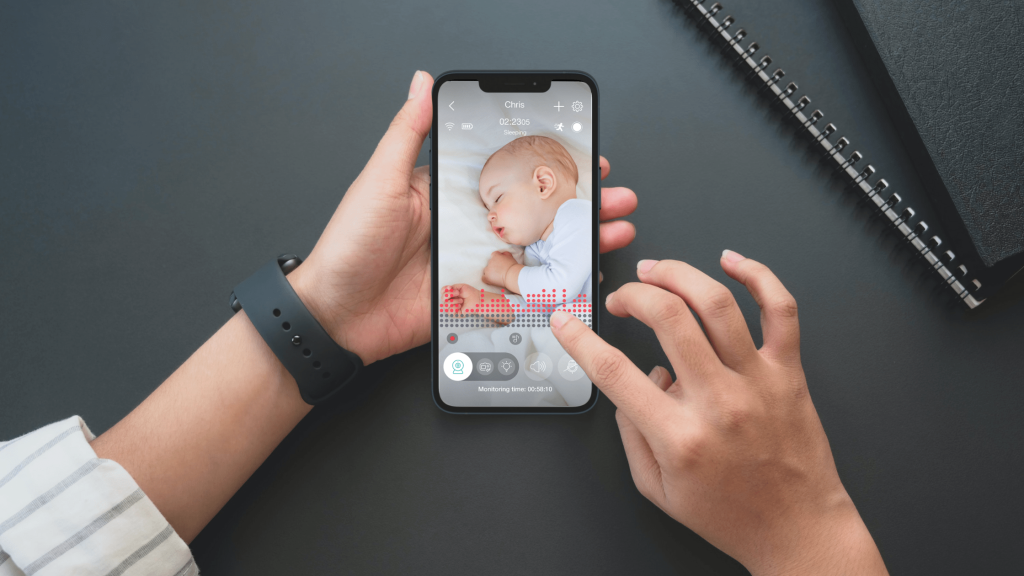
Don’t Know When To Stop Using the Baby Monitor? Here’s What Experts Recommend
- Created:
23. 11. 2022 - Updated:
26. 7. 2023
Are you wondering when to switch off your baby monitor for good? The truth is, there is no ‘right’ time. Some parents are happy to switch it off after 6 months, whilst others continue to use one into the school years. Read on for help with making a decision.
Let’s face it:
Becoming a parent marks the beginning of many things. New plans, new hopes, new dreams, new possibilities…
And do not forget – new and constant worries.
That said, the baby monitor is one of the best pieces of tech ever invented.
Mainly because these gadgets allow you to keep tabs on your child’s well-being at any given time; while handling other pressing matters.
Double the convenience and fewer reasons to worry, right?
But…
When is it time to part ways with your trusted baby monitor?
As with many parenting decisions, the answer is not always a straightforward one. It can depend on several factors. That includes the layout of your home, your child’s sleeping habits and, importantly, how you feel as a parent.
That said:
Here’s everything you need to know about baby monitors and when it’s time to retire them.
What is a Baby Monitor?
A baby monitor is a perfect accessory for keeping your child within earshot at all times, without disturbing them.
Because, let’s face it…
Accidentally waking your baby can a soul-destroying experience!
A monitor enables you to effortlessly check on your child; without stopping what you’re doing, physically going to their room, or even getting off your bed at night.
What are the Benefits of Using a Baby Monitor?
Parenting is hard…
It can feel like an endless cycle of sleep deprivation, feeding, and nappy changing.
Right?
However, a baby monitor gives parents a much-needed break. Knowing that they can leave the room while their baby is asleep, rest up, or get something else done.
In general, a baby monitor offers several benefits, including:
Some Peace of Mind
Whilst your child catches some zzz’s you can catch a break.
You can make headway on chores or catch your favorite tv show. A baby monitor allows you to always hear when your child needs you.
Extra Features
Well:
As technology has developed, baby monitors have become more than just listening tools.
Some have video features. This allows you to oversee any bedtime antics. Even better, some monitors are fantastic sleep aids that play lullabies and white noise to settle a baby.
Promoting Independent Playtime
Learning to play alone, away from the presence of a watchful parent, is an important milestone for a young child.
It gives them confidence and the ability to explore their imaginations freely.
Having a baby monitor allows you to give your toddler some space whilst remaining under your supervision.
The Cot-to-Bed Transition
Look:
This transition is a huge milestone for children.
It can also be a pretty exhausting one for parents. Especially, if you have a child who is yo-yoing out of bed and playing rather than sleeping.
Having a baby monitor switched on allows you to hear, and even see, what your little one is up to behind closed doors.

At What Age Should You Stop Using the Baby Monitor?
Unfortunately:
There are no official guidelines for when to stop using a baby monitor. Thus, it is very much a personal choice.
However, there are certain milestones which can help you decide.
For example:
At 6 months
By six months, your baby is (hopefully) sleeping for longer stretches and waking less to feed.
Plus:
They should now be loud enough for you to hear them cry. Or if your home is small enough and it’s easier to hear your child crying , you could try switching off the monitor.
At 1 Year
Now:
Some parents choose to stop using a baby monitor at the age of one.
This is because, at this time, most kids’ sleep patterns have settled and gained some consistency. Plus, the child is probably having two naps daily. So, it might feel like it’s time to retire the baby monitor.
However:
You should also consider this fact…
At this age, most children tend to start experimenting with cot-climbing. And while it may feel like the right time to stop, we’d recommend you keep the monitor switched on.
At 2 Years
Around this age, you may be considering moving your toddler into a bed.
Whilst some parents feel comforted that their child can now find them if the need arises, others may feel anxious about nighttime wanderings.
If this is a concern, keep your monitor on until you feel more comfortable.
At 4 Years
By age four, your child has made it through toddlerhood and should be fully adjusted to sleeping in their own bed.
What’s more?
They are also becoming conscious of privacy and being watched, and many parents feel that this is an appropriate point to switch off the baby monitor.
Should You Keep Your Baby Monitor?
You’ve turned it off, what next??
Well:
Once you decide to switch off the monitor, we absolutely advise keeping it for future use. It may come in handy when:
- You want to monitor independent playtime
- The child is napping whilst you are outside
- Away from the house
- Your child isn’t feeling well
- They are experiencing poor spells of sleep, such as recurring nightmares or sleepwalking
Reasons to Keep Using the Baby Monitor
Fact:
There are times when you must use a baby monitor regardless of how old your child is.
In most cases, it may be for reasons beyond just keeping a close eye on them; sometimes their safety might necessitate the use of a baby monitor.
What exactly are we talking about?
Well, here are a few instances that may require the use of a child monitoring device:
1. You Are a Heavy Sleeper
Are you the type of sleeper who could snooze through an earthquake?
If yes, don’t stress about it – you are not alone…
In such a case:
Having a baby monitor close by enables you to feel safe knowing you will always hear your child when they need you.
2. You Are Toilet/Potty Training
Admittedly:
Some children quickly adapt to night-time toilet training, while others find it takes a little longer.
Thus, a baby monitor can come in handy if your child has an accident or needs to visit the bathroom during the night.
3. Your Child has a Medical Condition
Now:
If your child has an underlying medical condition, a baby monitor provides a way of responding to your child promptly.
This not only makes life easier for you but also for your child.
4. You Live in a Large Home
Sometimes:
Living in a massive house might limit a parent’s respose speed and time.
Why?
Well, for starters, you may not hear your child crying soon enough. Then, there’s the small issue of distance between you and your child’s bedroom.
In the event of a mishap, the last thing you want is to reach your baby a minute late.
Right?
That’s why many parents livingin large homes choose to continue using a baby monitor. At least, until they feel confident that they will hear and respond swiftly to their child at any time.

Special Situations When It’s Okay to Stop Using a Baby Monitor
Yes!
You can turn off your baby monitor whenever you like, but some circumstances may prompt you to give it up.
For instance:
When It’s Disrupting Your Sleep
Get this:
Lack of sleep can cause stress to a nursing mother. Consequently, leading to a decline in milk production.
And that is the last thing you want; especially, if your child has the appetite of a baby elephant…
JK… But I hope you get the point.
Naturally:
Babies, and toddlers, are noisy sleepers.
Therefore, if you are constantly waking throughout the night to every grizzle and groan, then it may be healthier to switch the baby monitor off.
When Your Bedrooms Are in Close Proximity
It’s a bit obvious…
If your bedroom is very close to your child’s, then the likelihood is you will hear them easily and quickly.
So, there is simply no need for the monitor.
When Your Child Starts Becoming Aware of Privacy
At a certain point, your child will begin to become aware of what privacy means to them.
Right?
When that happens, the baby monitor may feel intrusive. And switching it off can allow your child the freedom they need.
But, remember:
You don’t have to get rid of the monitor for good.
You can always begin by moving the monitor further away from earshot or turning the volume down.
Even better:
You can always try turning it off for a few nights to see how you get on.
Ultimately the Decision is Yours
Well, one thing is for certain:
Deciding whether to ditch or keep the baby monitor isn’t always straightforward. It can depend on several factors; from the layout of your home to your child’s sleep habits.
Just remember…
Some parents will be content with retiring the monitor as early as 6 months. While others sleep soundly, knowing they can hear their child through toddlerhood and beyond.
Thus:
The decision is yours to make.
In fact, stopping the baby monitor doesn’t have to be final. By keeping it close by, you can rest assured that you have a back up option – should you need it.
With all that in mind:
Do you have any questions? Or would you like to contribute to the topic? If so, feel free to leave a comment below.
Frequently Asked Questions about When to Retire a Baby Monitor
How Long Do You Use a Baby Monitor?
There is no hard and fast rule. Some parents decide that around 6 months is right for them, while others choose to keep the monitor until school age. It is when you are ready.
What Age Do You Need a Baby Monitor?
It is recommended to have a baby monitor from birth. Even if you share a room with your baby, a monitor is handy for nap time or when you step out for a bit.
When Should Toddlers Stop Using White Noise?
White noise is a popular sleep tool and can make all the difference to your child’s quality of sleep. Plenty of older children and adults use white noise to drift off to sleep, so feel free to continue for as long as your child is happy.






